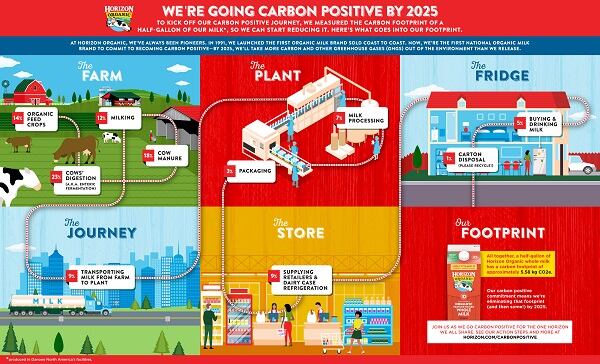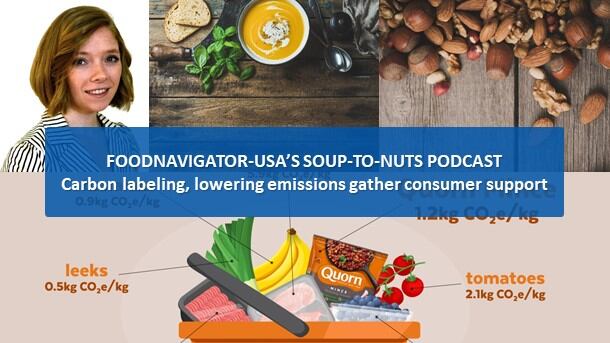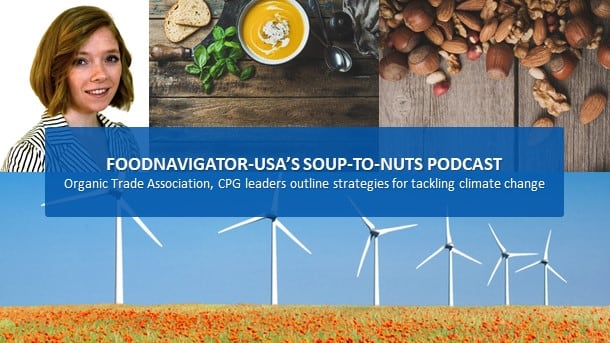“Since our announcement one year ago, the Horizon Organic team has completed and published an executive summary of our life cycle assessment to keep us on track to become carbon positive by 2025 and to better understand our carbon footprint,” Deanna Bratter, head of sustainable development at Danone North America, told FoodNavigtor-USA.
She explained that the life cycle analysis not only will help Horizon Organic set priorities for lowering its emissions, such as encouraging regenerative agriculture, but by publishing it she said the company hopes to encourage others to join its journey.
For example, by being transparent about its goals and progress, Horizon Organic will show other industry players interested in following suit what works and what doesn’t. Additionally, its openness could drive sales by attracting and maintaining consumers who want to support products and brands that share their values.
“The reality is consumers prefer brands that are more sustainable and match their values,” Bratter said, noting research conducted by IRI and the NYU Stern’s Center for Sustainable Business that found 50% of CPG growth from 2013-2018 came from sustainability-marketed products and that products with sustainability claims on-pack delivered nearly $114 billion in sales in 2018 – up 29% from 2013.
“Horizon is meeting these consumer demands by the nature of our products, our purpose and activations through this latest announcement on our carbon positive progress,” Bratter added.
In the following Q&A with FoodNavigator-USA, which has been edited lightly for clarity and length, Bratter explains why Horizon Organic has set the bold goal to be carbon positive by 2025, where it is at in the process, what challenges and opportunities the life cycle assessment published April 1 revealed and how Horizon Organic is addressing them.
FoodNavigator-USA: Set the stage by describing why becoming not just carbon neutral – but carbon positive – is important to Horizon Organic, the planet and the extent to which it is important to shoppers.
Bratter: Horizon Organic is committed to farming for our future and that has been part of our heritage since we pioneered organic dairy standards with the USDA more than 30 years ago. As the world’s largest USDA Certified Organic dairy brand and part of the B-Corp community, we believe the health of our planet and our people is intrinsically intertwined.
Time is not on our side when it comes to climate change and we understand that dairy can, and should, be a part of the solution. As such, we’re evolving the ways we work with our farmer family partners, our cows, and even our soil, to become carbon positive by 2025, to help reverse and transform the negative impacts of dairy on our planet.
FNU: What is Horizon Organic’s timeline for becoming carbon positive and where is the company on its journey?
Bratter: Horizon Organic aims to be carbon positive by 2025, which means that we will reduce as much as possible, compensate our remaining emissions and then go beyond, removing or preventing additional carbon from entering the atmosphere.
Since our announcement one year ago, the Horizon Organic team has completed and published an executive summary of our life cycle assessment to keep us on track to become carbon positive by 2025 and to better understand our carbon footprint. This allows us to prioritize certain projects, such as regenerative agriculture, and work with our farmer partners to begin implementing beneficial practices.
Additionally, we are on track to certify the first products in our Growing Years line as carbon neutral through a certification verified by the Carbon Trust this year. Success is going to be measured by change over time, and we have established milestones to help us achieve this ambitious goal, the first of which is the certification of our Growing Years whole milk half gallon. Along this journey we will remain committed to transparency and provide updates on our progress along the way.
FNU: Horizon Organic recently completed its life cycle assessment. Where do most of the company’s greenhouse gas emissions come from and how is Horizon Organic address these?
Bratter: Two-thirds of Horizon’s greenhouse gas (GHG) emissions come from on-farm activities such as soil management, enteric fermentation (more commonly understood as cow burps), and manure management and milking. The remaining one-third is from off-farm activities like manufacturing and transportation and consumer use phases.
We are addressing on-farm emissions by working in partnership with our family farmers to improve soil health, optimize manure management and diet and improve the lives of cows over the long-term by keeping them cool and comfortable.
Off the farm, we’re improving processing and distribution through renewable energy and we’ve also pledged to accelerate transition to low-carbon and sustainable fuel technologies by supporting the BSR™ Sustainable Fuel Buyers principles to help lower emissions from processing plants to retailers.
We’re also continuing to evolve packaging - our Horizon Organic half-gallon cartons are currently widely recyclable in the US, and the brand is aiming to make 100% of its packaging recyclable, reusable, or compostable by 2025.
FNU: Let’s take a closer look at Horizon Organic’s efforts to improve soil health. I understand that you are enrolling farmers in the Danone North American Soil Health Initiative. What does this initiative entail and what is the significance of the percentage of farmers, land and milk that are already enrolled? How many more do you hope to enroll in the next year or two?
Bratter: Danone North America’s soil health initiative is the most comprehensive regenerative agriculture program in the U.S. dairy industry. Launched in 2017, the soil health initiative brings together experts and academics to build best-in-class soil health programs to benefit farms and communities across the Danone North America portfolio, including Horizon Organic. We partner with Sustainable Environmental Consultants, and it’s EcoPractices platform, to conduct in-depth sustainability analysis and reporting on soil health. Many Horizon Organic farmers are already enrolled in our Danone North America (DNA) Soil Health Initiative, which represents 28,000 acres of our organic milk supply.
Over the next two years, we aim to collaboratively establish goals with farmer partners, pilot innovative technologies to drive change, launch industry leading tools and programs to encourage greater regenerative management adoption, finance projects to accelerate more impact, and achieve enrollment of 100,000 acres total under the regenerative agriculture program.
FNU: You mentioned that the bulk of emissions come from cows’ digestion and manure – to things that cannot be avoided. How are you addressing these in your push to become carbon neutral?
Bratter: Cow digestion and cow manure make up nearly one-third of on-farm emissions. To address manure management, we’re working with our farmer partners to design the most effective composting and invest in optimized manure storage and use options. To address cow’s digestion, we’re exploring ways to optimize our cows’ organic diet while ensuring that we continue to follow industry-leading animal welfare standards.
FNU: The infographic Horizon Organic shared shows that refrigeration at the store and home use for 9% and 5% of the company’s emissions. How is Horizon Organic tackling this?
Bratter: Once the milk leaves our processing plants and is sold to retailers, what happens next is largely out of our control. But through partnerships and outreach, we're working to make strides through our carbon positive work.
For example, at retail and at-home refrigeration emissions can be lowered by sourcing renewable electricity as a clean power source. Horizon is supporting policy to address climate change so that our retailers and consumers can benefit from easier and more affordable access to renewable energy.
FNU: You mentioned that Horizon Organic is also working to reduce the environmental impact of its packaging. Tell me about the changes you are making on this front?
Bratter: All Horizon Organic half-gallon cartons are currently widely recyclable in the US, and the brand is aiming to make 100% of its packaging recyclable, reusable, or compostable by 2025. The paperboard used to make our half-gallon cartons is certified by the Forest Stewardship Council (FSC) and each package features How2Recycle labelling to help inform consumers on how to properly recycle their Horizon packaging once they’ve enjoyed the product. We’re also featuring more information about our carbon positive by 2025 commitment on Horizon Organic half-gallon packaging which consumers can find on shelf starting this month.
FNU: What other components is Horizon Organic most proud of and where are the most significant challenges?
One of the most rewarding parts of this project is working with our farmer partners. We view them as partners on this journey. The reality is our farmers know their land, their animals, and the need for sustainable transformation better than anyone. But we understand that this often requires investment, and we are committed to supporting our farmers and communities as they take on the work to address and mitigate the effects of climate change. Our $15 million Horizon Farmer Investment Fund will help support our farmers with low and no-cost loans to get the training, tools and technology it will take to meet our carbon positive commitment and foster environmental resiliency.
2025 is quickly approaching, but we’re committed to reaching our carbon positive by 2025 goal and feel confident that we can help shepherd in a new future for organic dairy.
Our next milestone is the certification of the Horizon Growing Years whole milk half gallon this year, followed by the entire Growing Years line. Success is going to be measured by progress and we have established milestones to help us achieve this ambitious goal. Along this journey we will remain committed to transparency and will provide updates on our progress along the way.
FNU: Many industry stakeholders are watching Horizon Organic’s progress on this project as they too look for ways to reduce carbon emissions and become more environmentally friendly. What advice do you have for them?
My biggest piece of advice is to remember that we’re all in this together and collective action is how we’ll driving meaningful impact. Climate change is the greatest challenge of our time and we recognize the significant work that is necessary to reach our ambitious goal. We are committed to transparency along the way and we hope that others will follow in our footsteps toward a more sustainable future for food and agriculture.




